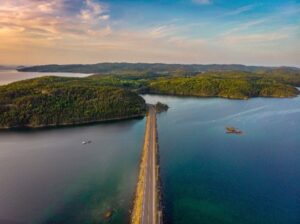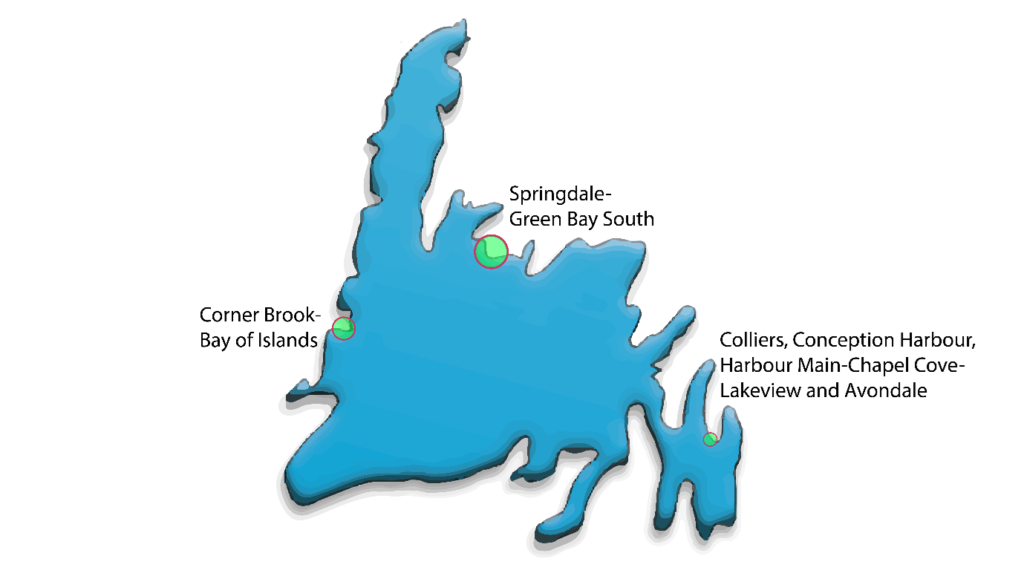Submitted by: Geoff Pevlin, NLWIC Media & Information Student Assistant
In what’s being touted as a win-win-win scenario, CNA’s Office of Applied Research and Innovation (OARI) has teamed up with Municipalities NL (MNL) and the college’s Tourism & Hospitality program for a unique real-world educational experience for students.

It’s no secret that the tourism industry in Newfoundland and Labrador (NL) has faced unprecedented challenges during the COVID-19 pandemic — travel restrictions, mandatory quarantines, flights cancelled, bars, restaurants and many businesses forced to close or scale back operations.
The college also had to quickly pivot, with some challenges, to online learning. For Susan Daw, instructor with the Tourism & Hospitality program, the question was how to maintain meaningful engagement with industry while being restricted to virtual learning.
“Being online for the last two years has shifted the way we do things,” said Daw. “We had to become a little bit more creative.”
Creative Collaboration
Daw found her answer when approached by Ashley Nguyen from OARI, which acts as a bridge between classroom and community. OARI networks with outside organizations to identify problems and then look within the college to make beneficial connections.

Consequently, OARI teamed up with MNL to offer a unique collaboration opportunity: assign students a real-world project that matches them with municipalities to develop regional marketing strategies.
“We’re taking the problems that the tourism sector is having, and we’re turning them into content that can be embedded into the curriculum,” said Nguyen.
The regional tourism assignment is part of a larger MNL initiative called the Municipal Pipeline Project, which began in the spring of 2021. By November 2022, the project had already involved over 50 communities across the province and 60 students in 11 CNA programs.
“The goal is to create win-win situations,” said Chris Adams, Work Integrated Learning Coordinator at MNL. “We want to give students in the province an opportunity to experience what it’s like to work with a municipal government. Give them opportunities to use what they’re learning in their programs to help municipalities in the way they need help.”

.
The Regional Tourism Project
In their NL Tourism Destinations course, Daw divided 15 students into groups and partnered them with municipalities in three regions across the island. The project had three goals
-Identify the region’s tourism offerings;
-Create sample itineraries for various traveller types; and,
-Identify potential marketing strategies the regions could use.
Individual municipalities have limited budgets. Nguyen says, “they have so few resources that they don’t always have time to look at tourism from an economic development perspective.
“By lumping communities together using the regionalization strategy, they can share resources and pool the things they have.”

Creating Opportunity out of Challenge
Like many pandemic-era projects, a major challenge of this assignment centred around the students’ inability to meet with municipalities and view their tourism assets firsthand. This restriction meant that the students relied heavily on email and MS Teams meetings.
“A major challenge with this type of research was realizing just how little information there was about some rural businesses,” said Kira Skinner, a Video Game Art & Design student, who took NL Tourism Destinations as an elective and worked on this project.
“We found that we really had to dig for quite a few small businesses when researching our itineraries, which is a direct correlation to why we were doing the project in the first place!”


But this virtual limitation also presented an opportunity: during weekly Zoom sessions, Adams coached students in various soft skills, including communication, presentation, time management and health and safety.
“Within the Municipal Pipeline Project, weekly sessions were held to discuss both the local tourism industry and how we as individuals can better ourselves in the workforce,” said Skinner. “So I will certainly be taking the wellness tips and workplace etiquette that I learned into future endeavors.”
Win-Win-Win
The results of this collaboration became clear: students benefit because, “they learn a lot about what’s out there, different opportunities,” said Daw. “They get to work with stakeholders in the industry and get to work on a real-life project, which I think is really exciting.”
The enthusiasm doesn’t stop with the instructors and administrators.
“This project was incredibly valuable,” said Skinner. “Tackling real-world projects like this one gives students worthwhile experience in their field.”
The municipalities have also gained. Kate Furey, instructor in the Tourism & Hospitality program, says that although municipalities know they want to bring people to their community, they might not know how.
“By the students doing all this research and bringing to light all that [the communities] have and how they can market it was very eye opening for them to realise that ‘Yeah, we have a lot to offer to visitors to our communities.’”
Adams states that, through his work at MNL, he has discovered that one of the biggest challenges facing municipalities is that they sometimes lack “the breadth of knowledge or workforce they need to complete a lot of the projects they need done.” By having students embark on these real-world projects, “the communities themselves develop in ways they otherwise wouldn’t be able to,” he added.
Beyond the students and municipalities, “the college can benefit at the same time by really learning what the real needs of the community are so the curriculum can be based on real scenarios instead of arbitrary ones,” said Adams. “Sometimes I say win-win-win.”
Where to from here?
A triple-win assessment is great coming from MNL, but what of the municipalities themselves?
“I would totally do it again. I think it’s fantastic. I would like to see the program carry on,” said Nicole Holland of the Green Bay South Regional Tourism Association.
“I’d like to see it go from one step to another step to another step. It would be nice if the students can continue with the information that they have … and maybe they can take the information they gathered from this in the first semester and take that with them and build on it.
Adams agrees, and his goals are to get more campuses involved, more regions, and more students in more programs.

If the pandemic has taught the world one thing, it’s the importance of flexibility and the willingness to pivot to meet ever-changing conditions.
“The way things are shifting, we’re always trying to innovate and grow and change and give the students the best learning experience as possible,” said Daw.
And this sentiment certainly doesn’t end at the classroom.
“Companies and communities need to adopt technologies, develop new tourism products and new lines of business for themselves to be sustainable which is exactly the type of thing that applied research and work integrated learning at the college can play a major role in,” said Nguyen.
MNL and CNA will continue to work together to support student experiential learning. In 2019, CNA, MNL and the Professional Municipal Administrators NL signed a five-year Memorandum of Understanding outlining a partnership focused on initiatives related to training, innovation, applied research and economic/community development.


